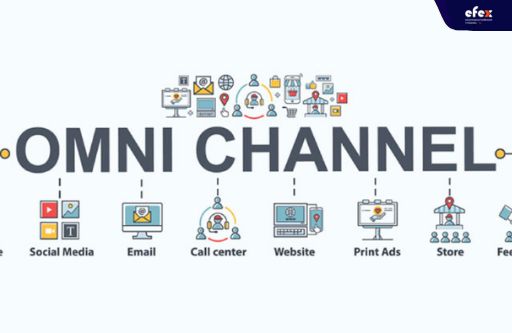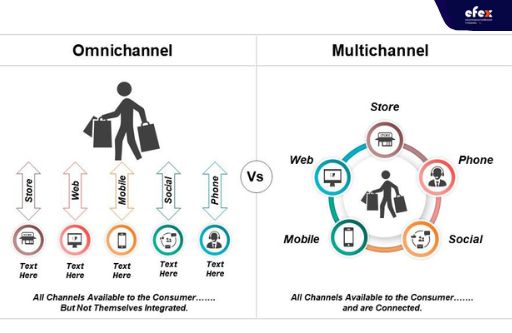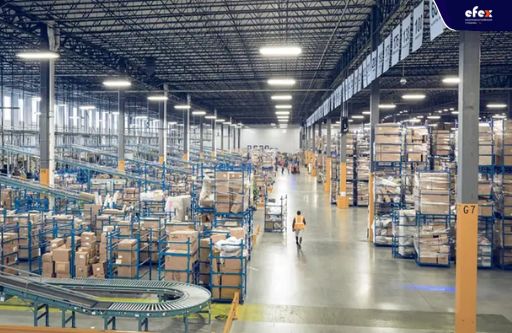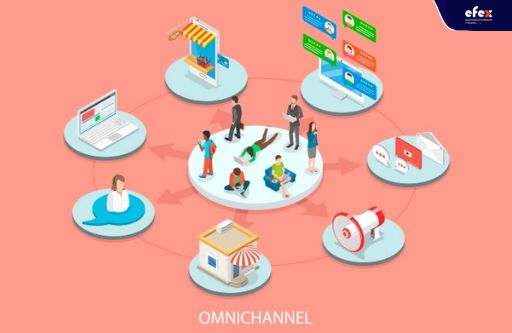
More Helpful Content
In the modern retail landscape, consumers demand seamless and efficient shopping experiences across multiple channels. To meet these expectations, businesses are increasingly turning to omnichannel fulfillment strategies. This blog takes a deep dive into the concept of omnichannel fulfillment, breaking down its core principles and examining the advantages it brings to modern businesses.
Additionally, we’ll explore the challenges companies face when implementing these systems and offer practical strategies to achieve success in this competitive and fast-paced landscape. Whether you’re looking to enhance your fulfillment operations or better understand the role of omnichannel in today’s retail space, this guide is designed to provide valuable insights and actionable takeaways

Omnichannel fulfillment refers to the process of managing and delivering orders across multiple sales channels, including online stores, eCommerce platforms, physical retail locations, marketplaces, and mobile apps. The goal is to provide customers with a unified and consistent experience, regardless of how or where they shop. This approach integrates inventory, logistics, and technology to ensure a smooth flow of goods and services from the point of purchase to delivery.
Unlike traditional single-channel fulfillment, omnichannel fulfillment allows businesses to leverage multiple fulfillment methods, such as in-store pickup, ship-from-store, and direct shipping from warehouses. By synchronizing operations across channels, companies can meet customer demands faster and more efficiently.
>> Learn more: What is Fulfillment Logistics
>> Learn more: What Does Order Status Fulfillment Mean

Omnichannel fulfillment streamlines operations by integrating inventory and order management systems. This integration provides businesses with the capability to process orders more efficiently, reduce human errors, and significantly improve order accuracy. Real-time visibility into stock levels across various channels ensures that issues such as overselling, stockouts, or delays are proactively mitigated.
For example, if an online order can be fulfilled from a nearby retail store instead of a distant central warehouse, the delivery time is drastically reduced, enhancing convenience for the customer. Additionally, shipping costs can be minimized, creating a win-win situation for both the business and the consumer. These operational efficiencies not only save time and resources but also foster a higher degree of reliability and trust among customers, further strengthening the overall customer experience. In the long run, such streamlined processes contribute to the scalability and profitability of the business.

In today’s competitive market, meeting customer expectations is paramount. Omnichannel fulfillment enables businesses to offer a range of flexible options, including same-day delivery, curbside pickup, in-store returns, and free exchanges. These conveniences cater to the diverse preferences of modern consumers, empowering them to shop in ways that suit their individual lifestyles.
Moreover, providing consistent and reliable service across channels fosters trust and loyalty. A customer who enjoys a seamless shopping journey - from browsing online to receiving their order at home or picking it up in-store - is far more likely to become a repeat buyer and recommend the brand to others. Additionally, offering proactive communication, such as order tracking updates and personalized promotions, can further enhance the overall experience, building deeper connections with customers.
A robust omnichannel fulfillment strategy relies on integrated systems that provide real-time data on inventory, sales, and customer behavior. This level of visibility empowers businesses to make informed, data-driven decisions that are both accurate and timely, ensuring they stay competitive in a fast-paced market.
With comprehensive reporting capabilities, companies can identify emerging trends, predict future demand, and allocate resources with precision. For instance, understanding which products are trending in specific regions or during particular seasons enables businesses to stock inventory strategically, minimizing excess stock and reducing the risk of shortages. Furthermore, these insights can help optimize pricing strategies and promotional efforts, ensuring that marketing campaigns align with actual consumer behavior.
In addition, detailed analytics offer a clearer view of operational performance, helping businesses identify bottlenecks, reduce inefficiencies, and prioritize investments in areas that yield the highest returns. By leveraging these insights, organizations can not only enhance their operational effectiveness but also provide a more responsive and satisfying customer experience, ultimately driving loyalty and long-term growth.
A well-executed omnichannel strategy reinforces a brand’s reputation as reliable and customer-centric. By delivering consistent experiences and meeting expectations across all touchpoints, businesses can effectively differentiate themselves from competitors in a crowded marketplace.
Furthermore, offering personalized services - such as tailored product recommendations, exclusive offers for loyal customers, and special perks like early access to sales - can significantly enhance brand perception. These initiatives not only create a more engaging shopping experience but also foster emotional connections with customers, encouraging repeat purchases and word-of-mouth referrals.
A strong omnichannel approach also enables brands to convey a unified message across various platforms. Whether a customer interacts with the brand online, in-store, or through social media, the consistency in tone, values, and service quality builds a cohesive identity that resonates with consumers. Over time, this unified experience helps establish trust, solidify customer loyalty, and position the brand as a leader in its industry.

One of the biggest challenges in omnichannel fulfillment is maintaining accurate inventory visibility across all channels. Discrepancies in stock levels can lead to overselling, backorders, or delays in order fulfillment—all of which can damage customer trust.
To address this challenge, businesses need integrated inventory management systems that provide a single source of truth. This ensures that inventory data is updated in real-time, reducing the risk of errors and improving operational efficiency.

Building a fulfillment infrastructure that supports omnichannel operations can be resource-intensive. It requires investments in technology, staff training, and logistics networks. For smaller businesses, these costs can be prohibitive.
Even for larger organizations, scaling operations to meet demand across multiple channels can be complex. Businesses must carefully evaluate whether to keep fulfillment in-house or partner with third-party logistics (3PL) providers to manage operations more effectively.


Each sales channel has unique requirements and customer expectations. For example, customers shopping on a marketplace like Amazon may prioritize fast and affordable shipping, often expecting options such as next-day or same-day delivery. Meanwhile, those visiting a physical store might value personalized assistance, in-depth product information, or the ability to immediately take their purchase home.
To succeed, businesses should tailor their fulfillment strategies to address the specific needs and nuances of each channel. This includes optimizing delivery methods to ensure speed and reliability, customizing packaging to enhance the unboxing experience, and streamlining communication to keep customers informed at every step. For instance, offering real-time updates on order status and delivery times can build trust and satisfaction.
The backbone of a successful omnichannel fulfillment strategy is technology. Businesses must invest in tools like inventory management software, order management systems (OMS), and warehouse management systems (WMS) that integrate seamlessly across channels. These systems act as the foundation for synchronized operations, ensuring that data flows smoothly between sales platforms, warehouses, and customer service teams.
Advanced technologies like artificial intelligence (AI) and machine learning (ML) can further revolutionize operations by enabling predictive analytics, demand forecasting, and automated decision-making. For instance, AI-driven tools can analyze historical sales patterns to anticipate future demand, helping businesses stock inventory more efficiently. Machine learning algorithms can also optimize delivery routes in real time, reducing shipping times and costs while enhancing customer satisfaction.
Additionally, emerging technologies such as Internet of Things (IoT) devices can offer even greater visibility into supply chain operations. Smart sensors and trackers can monitor inventory conditions, such as temperature and humidity, ensuring product quality during transit. By leveraging these innovations, businesses can stay agile, responsive, and competitive in a rapidly changing market, ultimately providing a superior experience for their customers.
For businesses that prioritize control and customization, keeping fulfillment operations in-house can be a viable strategy. This approach allows companies to directly oversee processes, maintain quality standards, and implement personalized services that align closely with their brand identity. With in-house operations, businesses have the flexibility to adapt quickly to changing customer demands, experiment with new fulfillment methods, and introduce unique touches such as branded packaging or custom inserts.
However, managing in-house fulfillment requires significant resources and expertise. Businesses must ensure they have the infrastructure, staff, and technology to handle the complexities of omnichannel operations efficiently. This includes investing in advanced inventory management systems, robust warehouse setups, and skilled personnel to manage daily operations.
Partnering with a third-party logistics provider can be a cost-effective solution for businesses looking to streamline omnichannel fulfillment. A single 3PL can handle tasks like inventory management, order processing, and shipping across multiple channels, allowing businesses to focus on their core competencies.
Choosing the right 3PL partner is critical to success. Businesses should evaluate providers based on their expertise, technology capabilities, and ability to scale operations as needed. A reliable 3PL can help businesses achieve faster delivery times, reduce costs, and enhance customer satisfaction.
Additionally, working with a 3PL can lead to significant improvements in delivery times and cost efficiency. Businesses can offer faster shipping options, such as same-day or next-day delivery, without incurring excessive expenses. This capability not only enhances customer satisfaction but also strengthens brand loyalty by consistently delivering positive shopping experiences. In the long term, partnering with the right 3PL can provide a competitive edge, helping businesses navigate the complexities of modern retail with greater confidence and agility.
EFEX provides a comprehensive omnichannel fulfillment solution tailored to address the diverse challenges of modern retail. By combining cutting-edge technology with an extensive logistics network, EFEX empowers businesses to deliver a seamless shopping experience across multiple sales channels. This approach not only enhances customer satisfaction but also improves operational efficiency, positioning businesses for sustained success in an increasingly competitive marketplace.
Key features of the EFEX solution include:

In today’s dynamic market, omnichannel fulfillment is no longer a luxury but a necessity for businesses aiming to stay competitive and meet rising customer expectations. By understanding the benefits, addressing the challenges, and implementing effective strategies, companies can build a robust fulfillment model that not only delivers efficiency but also fosters long-term customer loyalty and brand growth.
Omnichannel fulfillment represents a powerful opportunity to streamline operations, improve customer satisfaction, and create a seamless shopping experience across all sales channels. However, achieving success in this area requires the right blend of technology, expertise, and infrastructure.
That’s where EFEX comes in. With a comprehensive omnichannel fulfillment solution that includes real-time inventory management, flexible fulfillment options, and a free Order Management System (OMS), EFEX is uniquely positioned to help businesses navigate the complexities of modern retail.
Partner with EFEX today to unlock operational efficiency, elevate customer satisfaction, and position your business for sustained growth. Visit EFEX’s website or contact our team for a personalized consultation and discover how we can help you achieve your omnichannel goals.


